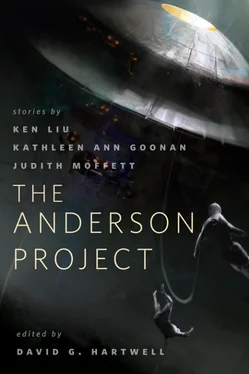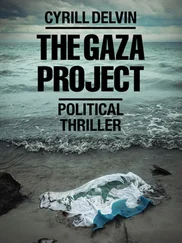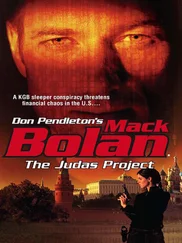He left. Professor Christian stared at the empty doorway; then he went and closed the door, and flopped onto the couch with his hands behind his head.
At the end of August, 2001, twelve-year-old Bobby Christian had just started the seventh grade. On August 26th he was home in bed with a start-of-the-school-year cold, a misery none of his present students had ever experienced, having been safely inoculated against the many common cold viruses shortly after birth. Bobby had a very sore throat and a slight fever. His mother came into his room from time to time with medicine or soup, but he was bored and fretful, and in the afternoon he fell asleep.
And dreamed that his bed was at the edge of an enormous metal platform, an immense flat structure hanging in space. Suddenly a huge sunspot uncoiled or flared out in the black sky above him, with big rolling clouds of steam or smoke exploding outward from the flare. Bobby, lying in his bed, saw people—he thought they might be suicides—start jumping off some higher object onto the flat surface of the platform. Now his perspective shifted; he could see the platform edge-on, and glimpsed in the distance a little plane flying alongside it—very close, way too close! He realized with a shock how easy it would be for one of the planes, for now there were several, to crash into the platform. The whole situation felt so dangerous, and frightened him so much, that it woke him up.
A few minutes later his mother came in with more aspirin and juice, and he told her what he had dreamed. On September 11th he was back in school, having pretty much forgotten about the dream himself, when the first plane flew into the first tower.
It turned out that a lot of people had dreamed dreams similar to Bobby’s, and that some of the dreams were much more specific, and had given clearer warnings. As usual, they weren’t taken seriously. Bobby’s mother took Bobby seriously, however, and encouraged him to write down his dream and the date, August 26, 2001. He still owned the paper journal in which he had printed and signed the account, his very first dream log entry. Underneath, his mother had written in her loopy cursive: “Bobby told this dream to me on August 26, 2001, after waking from a nap.”
It had started then. All though high school and after, Bob kept dreaming about things that hadn’t happened yet, and then realizing when they did happen that he had somehow acquired advance information. He started keeping a dream log in a disciplined way. As the internet, in its infancy on 9/11, became more powerful and useful, he had located a smattering of dream sites, which he bookmarked and kept up with. But there was no Center for Dream Research when he was ready for college, no government fellowships, no opportunity to be trained with other gifted young dreamers.
Instead, Bob completed a PhD in psychology with a dissertation on precognitive dreaming, not a field chosen with an eye to speedy career advancement. He taught at second-rate colleges for fifteen years, set up a private psychodynamic therapy practice, wrote the occasional paper on his unpopular subject, then struggled to find a journal that would publish it. He married, had one child, divorced. He resigned himself to academic invisibility.
And then he dreamed the Finley assassination before it happened, and blogged about it. He’d been among the first to be recruited by the Center.
Bob envied his students, with their cloaks and neon and power-animal tattoos. There was no way they could truly appreciate how fortunate they were. Still, he felt privileged to be helping them develop their natural gifts—and the kids were very gifted, quite a few of them more sensitive than he was himself. Years before, when his daughter Hadley had been a student at the Iowa Writers’ Workshop, she had quoted one of her professors, a seasoned old pro who had grown up before the proliferation of MFA programs like Iowa’s. He would have given anything, he’d said, to have been a student in his own playwriting workshop, but the next best thing was nurturing young writers, some of whom might become finer playwrights than he’d ever had it in him to be himself.
For seven years now, Bob had been nurturing young dreamers and staying alert for signs of precognition. More than once before he had felt the agitation he was feeling now, when someone’s dream first began to emerge as a foretelling of a widespread calamity. But this time the stakes were tremendous. This time they had a chance to save more lives, and prevent more damage, than had been saved and prevented in any potential disaster the Center had thus far managed to anticipate and stop—if he could shepherd his students into synchronicity with Josh’s dream.
He rolled off the couch, sat at his desk, and keyed: “Memo to Dream Interp 289 Students: Urgent.”
* * *
To incubate a dream, it helps to make a little ritual of the intention. Josh took a sauna and a dip, dressed in clean sweats, ate a small careful dinner picked up from a supermarket sushi bar (California roll seemed appropriate), washed it down with spring water, brushed his teeth, and asked his room system for Mendelssohn’s A Midsummer Night’s Dream . When the music started he sat down on his bed with a pad and pencil; the question had to be spelled out by hand, not by any of the various electronic means available to him, and not by voice recording. After a minute’s thought he wrote: “I want to know if an asteroid is about to strike the earth, and if so, where and when.” It was a more elaborate question than the protocols recommended, but he needed to know all three things. His painting was propped on his desk; he tore off the page and slipped it between the picture and its cardboard backing. Then he darkened the room and crawled into bed. He was asleep in seconds.
* * *
Bob had sent his memo, giving the class their emergency assignment and convening a special meeting for the following day. Urged by his gut and his own incubated dream to do more, that morning he had also stuck out his neck and sent an urgent request for the entire Center faculty to cancel their commitments and sit in on the session; so the seminar room was crammed with extra chairs and serious adults. For the students it was all a bit overwhelming, but they understood that they were at center stage in a developing drama, and sat around the seminar table with their dream logs open in front of them, looking both nervous and excited.
Bob began the session by carefully summarizing Josh’s part of the previous class meeting and the ambiguous results of the reentry exercise, while his colleagues gazed with intense interest at Josh’s painting, now taped to the wall by its backing. No one in the assembly had been told about Tim’s tsunami dream, the faculty members having till now no context to put it into, and the students being too suggestible to be given the tsunami idea before they’d done their independent dreaming. Bob’s memo had instructed them only to incubate the intention: “I want to go deeper into Josh’s dream ‘Space Ballet,’ in order to understand its meaning better.”
So now, before opening the circle, he asked Josh to describe his brother’s dream for his professors and classmates. While Josh was speaking, a stir went round the table as the students reconsidered their incubated dreams in light of the new information. And when he’d finished, and as each student rose and read out his or her log entry, the other students and the attending faculty worked their notebooks busily, looking things up, making notes, texting each other, connecting the dots and building a composite picture out of what they were hearing:
Yancey: “I’m at a big Olympic-size outdoor swimming pool. It’s very sunny and hot. There are a lot of people sunbathing around the sides of the pool. An enormous fat man does a cannonball off the high dive. He hits so hard that he splashes all the water out of the pool. The people around the sides are swamped in several feet of water. They run around screaming. Title: ‘Cannonball.’ Affect: I was terrified of the fat man even before he jumped. I was still terrified when I woke up.”
Читать дальше












